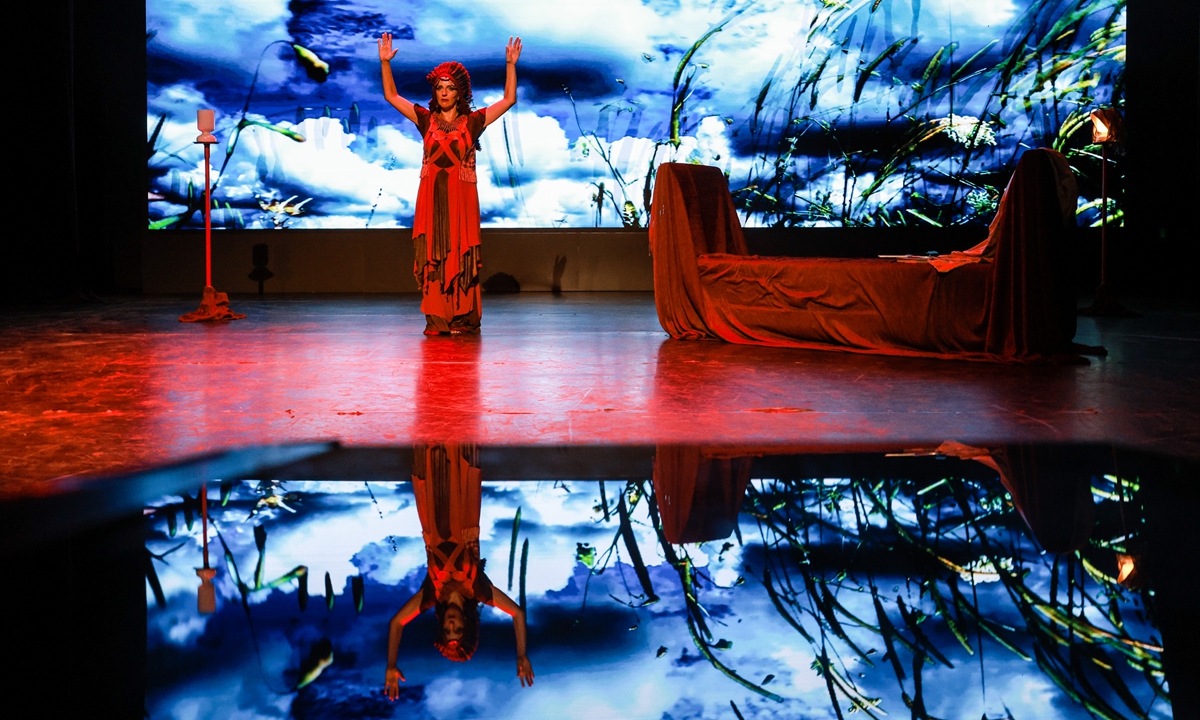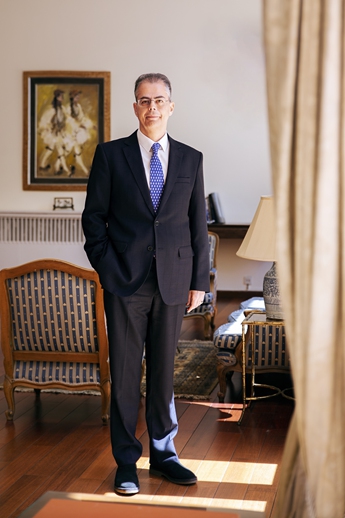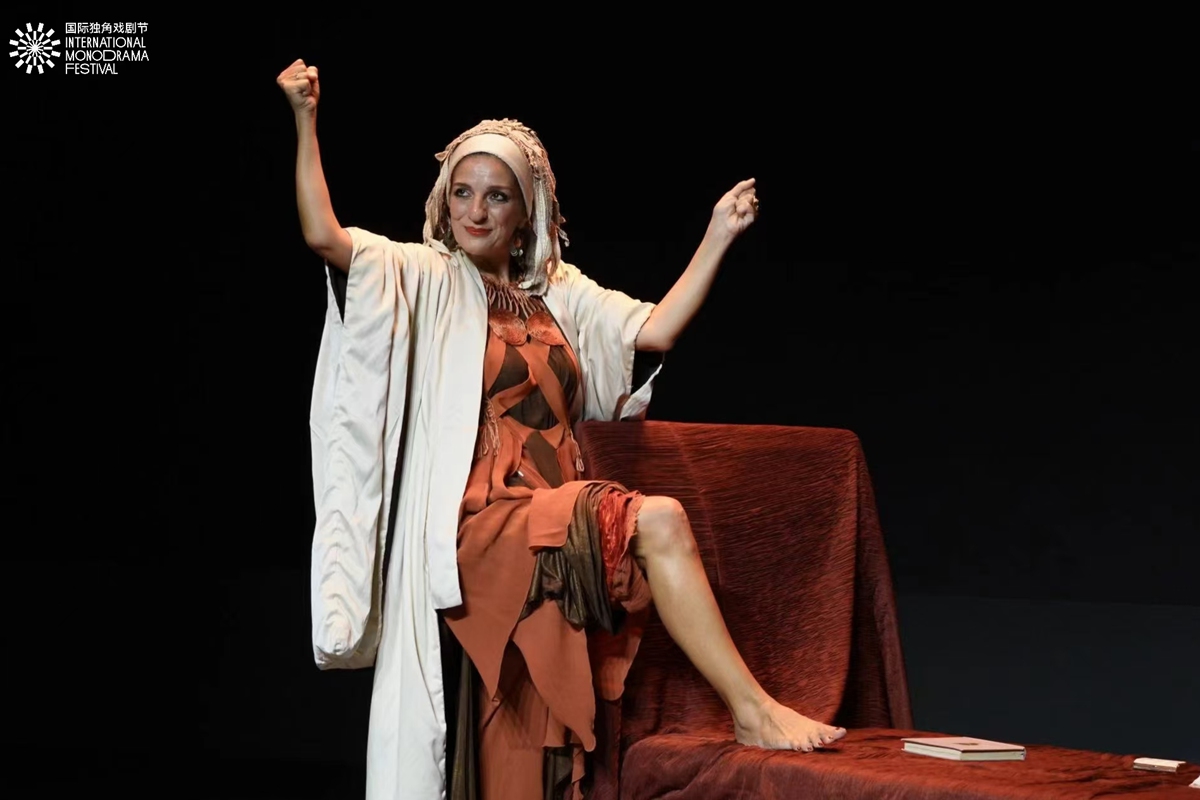
Promotional material for Women of Passion, Women of Greece Photo: Courtesy of Sino-Hellenic Performing Arts Alliance
When the spotlight shines on Greek stage actress Evelina Arapidi, she begins guiding the Chinese audience through a one-woman, three-role monodrama titled
Women of Passion, Women of Greece. Debuting in various cities including Beijing and Chengdu, the play of a distinctive genre has been touring around the country.
Noting theater a "more direct way than other forms of art" to bring Chinese audiences closer to Greece's profound cultural-historical legacies, Evgenios Kalpyris, Ambassador of Greece to China, told the Global Times that what follows the play are more exchange events in other cultural fields including art and film.

Ambassador of Greece to China Evgenios Kalpyris Photo: Courtesy of Embassy of Greece in China
'Common languages'With only one bed and a few lamp posts,
Women of Passion, Women of Greece stands out due to its minimalist set decor. Accompanied by Fotis Mylonas's live music, actress Arapidi seamlessly transitions between three female roles on stage. They are the mythical figure Medea, opera diva Maria Callas, and actress Melina Mercouri.
The three characters, one that appeared in Greek literature around 700 BCE and two other modern stars, embark on a train tour together. Through powerful monologues delivered by Arapidi, audiences are able to grasp ancient Medea's family tragedy, the love devotion of Callas, and Mercouri's versatile life story. In 1981, the artist became the first female Minister of Culture of Greece.
Tatiana Ligari, the play's director, told the Global Times that her choice of the three characters was not random. Although their experiences are different, what unites the three characters is their "passion for life" and tenacity in the face of life's conundrums. She said that these qualities also represent "the spirit of Greek culture" and are "common languages" that go beyond cultural differences to resonate with Chinese audiences.
"The play is liked by many Chinese audiences, especially the young ones. It makes me see how open-minded today's Chinese viewers are to international cultures," Ligari told the Global Times.
In 2016, the monodrama debuted at To Treno sto Rouf, a train carriage-turned-stage in Greece. It was brought to China to coincide with the 2nd International Monodrama Festival organized by several Chinese theater organs including the Beijing Drum Tower West Theater.
The mechanism in 2024 engages theatrical professionals from 14 countries including Greece, Russia, and Denmark. It has not only introduced the niche "monodrama" genre to the wider public, but also has inspired workers like Ligari to collaborate with the Chinese industry.
"When traveling to cities like Chengdu, I was able to see China's folk arts and operas. I wonder if I can create a show that combines Greek theater aesthetics with Chinese performing art elements," Ligari told the Global Times.
Women of Passion, Women of Greece is just one example that showcases the two countries' exchanges in the performing arts sector.
In 2022, an event dubbed "the theatrical temperature of the city" was launched to review Medea, a Chinese play in the form of Hebei bangzi or Hebei Opera that was adapted from an ancient Greek play.
The show debuted in 1989 in China. Along with Greek writer Nikos Kazantzakis's introduction of Peking Opera master Mei Lanfang to Greece, these milestones have made contemporary exchanges "boost trust and engage artistic consensus between China and Greece," Lin Wei, a theatrical industry insider, told the Global Times.
"Both Greece and China have long and colorful theatrical traditions which can be the fertile ground upon which to nurture cooperation between theatres and artists from both countries," Ambassador Kalpyris, told the Global Times.

Promotional material for Women of Passion, Women of Greece Photo: Courtesy of Sino-Hellenic Performing Arts Alliance
More to come Lina Mendoni, minister of culture of Greece, will attend an art exhibition called Countless Aspects of Beauty in Beijing in November, the ambassador told the Global Times.
The exhibition features 340 artifacts collected by the National Archaeological Museum of Greece. Regardless of whether the relics are from the Neolithic era or the Mycenaean culture, they show how dynamically the notion of "beauty" has been interpreted over time.
The exhibition, along with another called The Glory of the Aegean Sea that will open in December, are two highlights of the year. They also re-emphasize the tradition of exchanging arts between the two countries as an important part of relations. Back in 2005, an agenda called "Chinese Art Week" was launched to bring a large number of Chinese calligraphies, landscape paintings, and acrobatic performances to Athens, Greece.
"Greek and Chinese cultural exchanges extend in various fields," the ambassador said. He also noted that the embassy, as a bridge to connect people in China and Greece, is also hosting film and variety show events.
The film Remind Me is October's pick,which explores Alzheimer's as a theme. Its debut in Beijing is aimed at raising the social awareness of people in the community. Featuring famed Chinese writers like Xi Chuan, the embassy has also supported the launch of a variety show I Read Books on an Island (Season Three). Filmed on the Greek island of Crete, the show was a pioneering TV program that engages intellectual content encouraging nationwide reading practices.






